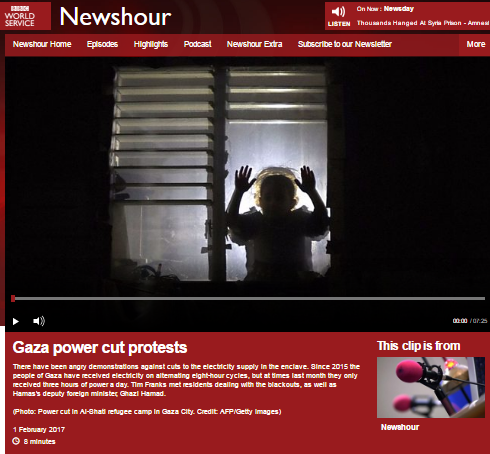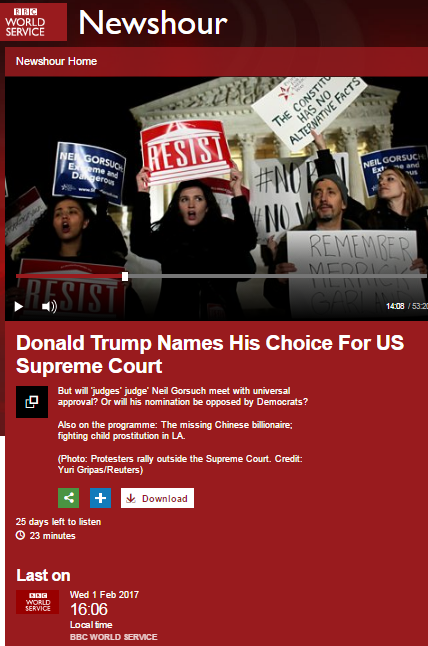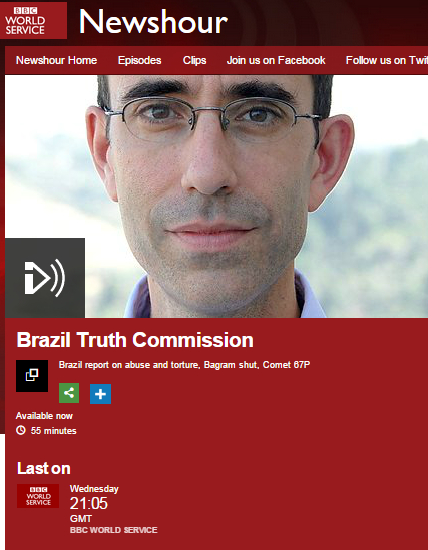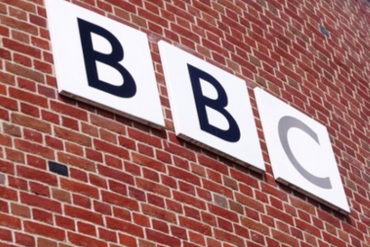In part one of this post we discussed the earlier section of Tim Franks’ report from the Gaza Strip which was broadcast on the BBC World Service radio programme ‘Newshour’ on February 1st (from 14:07 here) as part of a multi-part special feature.
A section of the report – including the baseless accusation of “collective punishment” – was later promoted separately by the BBC World Service on social media.
Following a sketchy portrayal of the electricity crisis in the Gaza Strip and the related demonstrations which took place last month, Franks went on to interview Hamas’ Ghazi Hamad.
Franks: “So what does Hamas have to say about the burdens and disillusions of so many of the two million Palestinians here in Gaza? And in particular about people now taking to the streets to protest? Ghazi Hamad is the deputy foreign minister.”
Hamad: “I think this is a natural thing. It’s not the first time and I think the authority here give this demonstration full support and permission.”
Franks: “Shots were fired in the air and some of the organisers were arrested.”
Hamad: “I think that the police that accompany they have been commanded to protect and to give full freedom to criticize Hamas. Look, I think all kind of [unintelligible] but when they started to destroy the company and destroy the tools and the doors and the windows and the equipment inside the [unintelligible] the police was obligated to interfere.”
Franks: “Did that really happen or was it just a few kids throwing stones?”
Hamad: “No-one is shot. No-one is wounded and maybe some people they have been taken to the investigation but I think all of them they are freed now.”
Franks: “I’ve got a bigger question which is the reason Gaza is in such a terrible place at the moment. I know you will say it’s because of the Israeli presence on the border of Gaza. I just wonder whether, given that nothing has changed for the better over the past ten years, you would give any thought to a…perhaps a more radical change from Hamas. That maybe it is time to engage in some way with the Israelis.”
Hamad: “I think you have to ask the question to the Israeli side.”
Franks: “I ask the Israelis but I’m asking you.”
Hamad: “Our experience with the Israelis – these people don’t want peace, they don’t want any kind of political solution.”
Franks: “Why don’t you test them?”
Hamad: “No, I mean if you look to President Abbas he tested them for ten years now. I think he’s a very moderate man. He believes in peace, believe in coexistence, believe in peaceful talks. He does not believe in intifada or armed struggle. He did everything in order to make the peace process successful but they are…”
Franks: “Except the Israelis can also say to him you don’t speak on behalf of the Palestinians ‘cos look at Hamas.”
Listeners then heard a statement from Hamas which is identical to the messaging they have been hearing from the BBC for weeks: the notion that Israeli building is the prime obstacle to the two-state solution.
Hamad: “But they are refusing every day. They say that he is not a partner, they opening more settlements, they are confiscating lands in the West Bank. No place for the two-state solution. I think…”
Of course Hamas rejects the concept of the two-state solution outright, but Franks chose not to challenge Ghazi Hamad on that point.
Franks: “But it’s also very easy for the Israelis to say look, President Abbas, you don’t speak for the Palestinians. Look how powerful Hamas is.”
Hamad: “But look on something on the ground. OK, this is maybe my ideology, is my thoughts but what are you going on the ground…”
Franks: “Listen, I hear what you’re saying about the Israelis and believe me, I ask the Israeli government lots of tough questions about what they are doing but I’m asking you and I’m asking about Hamas and I’m asking about the fact that because, for example, the Hamas charter talks about a war with Jews it’s easy…”
Hamad: “No, no…”
Franks: “No – hang on – it makes it easier for the Israeli government to say we don’t have a partner here.”
Hamad: “No, no, no. Don’t judge to the charter of Hamas. If you look there’s big a change inside Hamas.”
Franks: “It still says in the charter it’s about a Manichean war with the Jews.”
Hamad: “No, no. Look to the statements and the new vision of Hamas. Hamas has started to participated in the elections. Hamas has said frankly we accept the ’67 borders.”
Franks: “Hamas also puts out statements when, for example, four rabbis are stabbed in West Jerusalem praising a magnificent operation.”
Franks is referring to the terror attack in Har Nof in November 2014 which resulted in the deaths of six Israelis and about which the BBC found it appropriate to interview Ghazi Hamad at the time.
Hamad: “Well I think we have the right to fight against occupation because we…”
Franks: “But we’re talking about four rabbis in West Jerusalem. They were stabbed. I mean this was a couple of years ago.”
Hamad: “Every day we have people [unintelligible]. People are under the occupation. We have to use all the means against the occupation.”
Franks: “Ghazi Hamad from Hamas here in Gaza. That rhetoric – using all means against the occupation – may be familiar, as may be the idea that Gaza is a by-word for confinement, for shortages, for a confrontation with no exit. But it’s also a place that can bubble with pride and energy and later in the programme you’ll meet a woman who embodies that. We’ll ask whether there’s any chance that Gaza can escape what is pretty much a slow, suffocating decline at the moment.”
Franks’ subsequent interview with web developer Rana al-Qirnawi can be heard from 45:08 here. Following that, listeners heard a conversation between Franks and programme presenter Owen Bennett Jones which included promotion of the debatable notion that people are radicalised by difficult conditions.
Bennett Jones: “Now Tim, you were talking about Hamas earlier – talking to them – can you just give us a take on where Hamas stand now, how much popular backing there is, what’s the politics at the moment?”
Franks: “Well as far as Hamas are concerned, they say that they are fully in control and there is no doubt, Owen, that this place is a lot less unstable; it feels a lot safer internally than it did for many years…ehm…and when I used to come here. But there’s…there is also no doubt that some young people in particular are drawn towards harder line Salafist and Jihadist groups and, you know, this is something that I’m aware that senior figures in the Israeli security establishment have long been worried about as well: that as conditions deteriorate here, you are going to get increasing radicalisation – it’s just bound to happen.”
Bennett Jones: “Right and I think your sort of general purpose on this trip to…ah…to the Middle East is to sort of assess the viability of the two-state solution. What are your – as you start – what are your thoughts on that?”
Franks’ answer to that question reveals that he knows full well that Hamas is opposed to the two-state solution or any other kind of peace agreement with Israel – which of course begs the question why that crucial point is not sufficiently prominent in both his own reporting and the broader coverage by the organisation he represents.
Franks: “Well I’m… you know, these are the views in terms of this programme from Gaza. We’ve looked at Jerusalem earlier in the week. We’re going elsewhere later in the week. But in terms of Gaza the truth is, Owen – I mean yes; that was the starting point for this project – no-one’s really talking about it here. They haven’t been talking about it for years and it’s partly because there’s no real incentive to talk about it…ah…in public or with a journalist. After all, the official Hamas position is that in the long-term there’s no place for a Jewish state in the land of Palestine. But there’s a more immediate point I think…ahm…which is that, you know, the people here have far more direct concerns. It’s about the next meal, when is the power going to go off, how do you make money, what’s the water supply like – answer: not terribly good. So it’s those sort of much more quotidian dreary concerns that are driving people rather than any grand thoughts about a solution to all of this.
It is of course quite remarkable that a journalist could produce such a lengthy report (nearly 14 minutes long in total) from the Gaza Strip – especially one which purports to “assess the viability of the two-state solution” and includes an interview with a representative of Hamas – without uttering the word terrorism even once, without informing audiences of Hamas’ efforts to rehabilitate its military capabilities – including cross-border attack tunnels – and without mentioning the fact that it is those priorities which play a significant role in creating the difficult conditions for the residents of the Gaza Strip which he does report widely. Tim Franks, however, managed to do just that.
Related Articles:
Another BBC WS ‘Newshour’ Israel special – part one
Another BBC WS ‘Newshour’ Israel special – part two
BBC News again avoids telling audiences real reasons for Gaza power crisis
BBC WS radio ‘Newshour’ special from the Gaza Strip – part one




